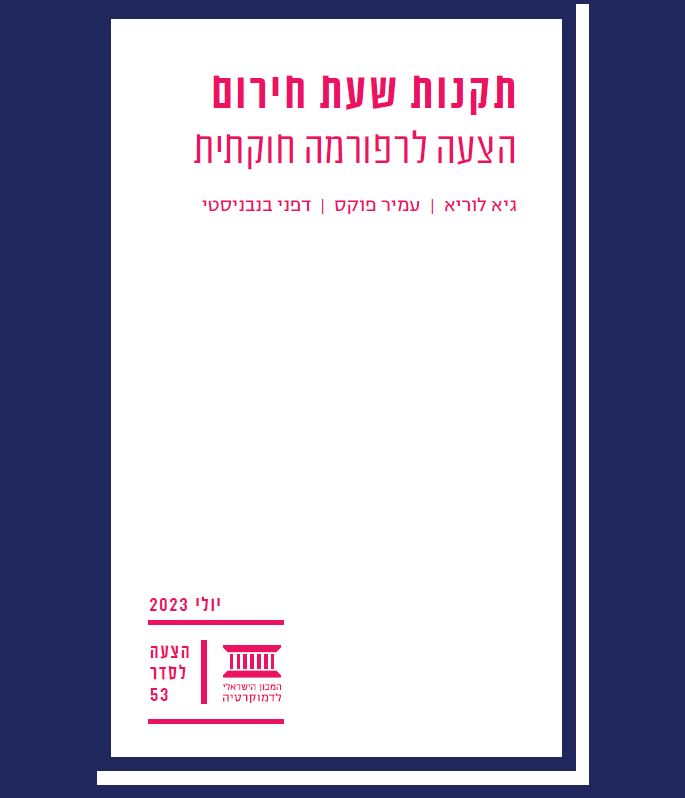Emergency Regulations:
A Proposal for Constitutional Reform

Abstract
This policy paper deals with the limitations on the emergency powers of the government set in the Basic Law: the Government, and particularly with the way in which the Knesset oversees the promulgation of emergency regulations by the government. In the past two decades, the governmental use of emergency regulations has been diminishing, particularly since the Supreme Court had decided, in rulings given in 1990 and in 1999, that emergency regulations should not be promulgated if there is recourse to regular Knesset legislation. Some scholars have even stated that the Court’s rulings on the issue turned emergency regulations into almost a theoretical measure. This argument was proven wrong when the Covid-19 pandemic broke out in early 2020, because the first months of the pandemic saw a wide-ranging usage of the government’s authority to promulgate emergency regulations, the widest since the establishment of the state of Israel.
In this research, we present a case study and compare the government’s use of emergency regulations to deal with the implications of the Covid-19 pandemic in the first few months of the outbreak, versus its use of regulations under the “Covid-19 Statute.” This statute was legislated a few months after the outbreak of the pandemic and it defined the government’s powers to promulgate regulations according to it. After the legislation of the “Covid-19 Statute” in July 2020, the government refrained from using emergency regulations, and instead promulgated “regular” regulations on the basis of that statute. The comparison between these two venues – emergency regulations and the Covid-19 statute regulations – reveals the crucial benefits of parliamentary oversight on the promulgation of regulations for the rule of law, for informed decision making, for public legitimacy and for the effectiveness of the regulations. Against this background, we suggest a reform in the manners of parliamentary oversight over emergency regulations. This research was conducted through a wide outlook on the legal ways of dealing with emergencies and on the principles that should guide the law in this context, both in the research literature and in comparison to the practices of other jurisdictions in general and particularly with regard to the Covid-19 pandemic. At the end of the policy paper we detail a proposal to reform the Basic Law: the Government, which is meant to tighten the Knesset’s oversight over the promulgation of emergency regulations.
Publication (in Hebrew) is available here
Dr. Guy Lurie is research fellow at the Center for Democratic Values and Institutions at the Israel Democracy Institute. He is an attorney and holds a PhD in History from Georgetown University (2013). He is a former coordinator of the Shamgar Commission for the Formulation of Rules of Ethics for Members of the Government, and served as a post-doctoral fellow at the Minerva Center for the Rule of Law under Extreme Conditions at the University of Haifa.
ד”ר גיא לוריא הוא עמית מחקר בתוכנית להגנה על ערכים ומוסדות דמוקרטיים במכון הישראלי לדמוקרטיה. ד”ר לוריא הוא עורך דין וקיבל את התואר דוקטור בהיסטוריה מאוניברסיטת ג’ורג’טאון בארצות הברית (2013). ד”ר לוריא היה מרכז ועדת שמגר לעניין גיבוש כללי אתיקה לחברי ממשלה, ועשה פוסט-דוקטורט במרכז מינרבה לשלטון החוק במצבי קיצון באוניברסיטת חיפה.
Dr. Amir Fuchs is senior researcher at the Center for Democratic Values and Institutions at the Israel Democracy Institute. He holds a doctorate from the Faculty of Law at the Hebrew University of Jerusalem and is a lecturer in the Politics and Communication Department at the School of Government and Social Sciences at Hadassah Academic College. From 2005 to 2011, he served as a member of the Minister of Justice’s Commission for Amending the Israeli Homicide Law.
Adv. Daphne Benvenisty is a research assistant at the Center for Democratic Values and Institutions at the Israel Democracy Institute. She holds an LL.B and an LL.M, both from the Hebrew University of Jerusalem. She has clerked at the Supreme Court in the chambers of Justice Neal Hendel.



